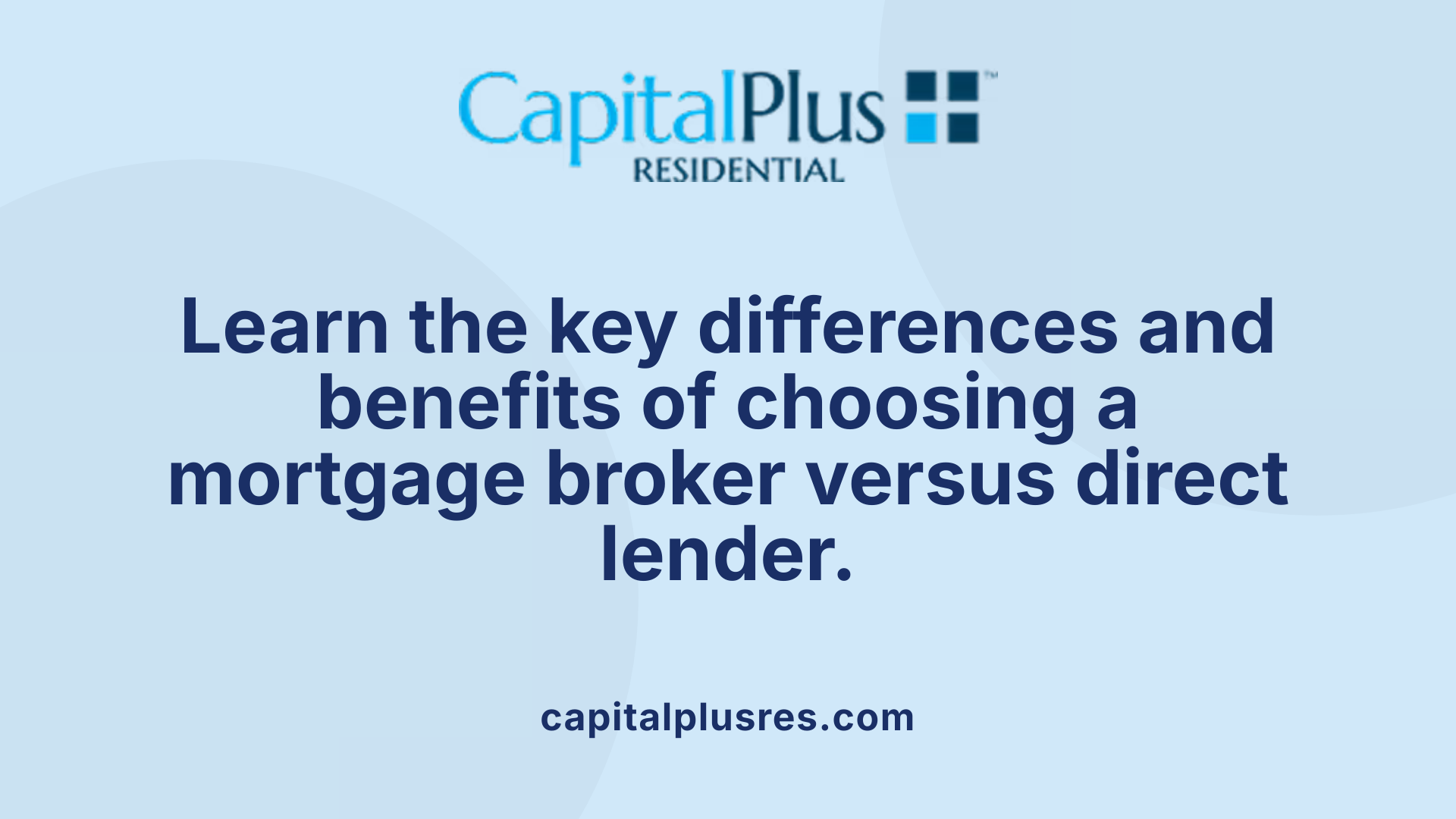Navigating the Mortgage Market: Why Comparison Matters
Selecting the right mortgage is one of the most significant financial decisions in a homebuyer's journey. With myriad lenders, loan types, and complex terms to consider, understanding how to effectively compare multiple mortgage offers is crucial. This article guides you through essential strategies to discern the best mortgage deal by looking beyond surface rates, enabling you to make an informed, cost-effective choice.
Understanding Mortgage Brokerage and Residential Lending Services
What are mortgage brokerage services?
Mortgage brokerage services act as a bridge between homebuyers and various lenders. Mortgage brokers work independently to help clients discover mortgage options that best fit their financial situation. They spend time comparing different loan products, guiding borrowers through the documentation process, and managing applications to simplify securing a mortgage.
By providing expert advice on mortgage types, interest rates, fees, and terms, brokers can often negotiate better deals than borrowers might find on their own. Brokers typically earn commissions from lenders, which can translate into savings or more favorable terms for the borrower. Their role is to make the home financing journey smoother, save clients time, and offer access to a wider selection of mortgage products. Regulatory oversight ensures brokers are transparent and align their guidance with the borrower’s best interests.
What are residential lending services?
Residential lending services refer to the activities of financial institutions like banks, credit unions, and non-bank lenders that provide loans to individuals for buying or refinancing homes. These institutions originate mortgage loans and handle their ongoing administration.
After granting a mortgage, residential lenders or servicing companies collect monthly payments, manage escrow accounts for property taxes and insurance, and assist borrowers with any questions. The servicing of loans may change hands over time due to loan sales or regulatory requirements. Residential lending involves both the initial loan origination and the ongoing management to ensure the loan is properly maintained until paid off.
Differences and benefits of each service type
| Service Type | Role | Benefits |
|---|---|---|
| Mortgage Brokerage | Acts as an independent intermediary | Offers multiple loan options across lenders, expert guidance, potential cost savings |
| Residential Lending | Lends money and services the loan | Direct loan provision, ongoing loan management, possible loyalty benefits |
Mortgage brokers provide personalized service aimed at finding the best loan among many options. Residential lenders focus on loan issuance and administration. Using a broker can expand choice and aid complex decisions, while going directly to a lender may simplify communication and service continuity.
The Crucial Role of Mortgage Brokers in Securing Home Loans

How do mortgage brokers assist clients in securing home loans?
Mortgage brokers serve as essential intermediaries between homebuyers and a broad network of lenders, many of which may not be directly accessible to the public. They assist clients by gathering and reviewing critical financial documents—including credit reports, tax returns, and income verification—to efficiently prepare and submit loan applications. By evaluating these details, brokers can match borrowers with mortgage options that best fit their financial profiles.
Access to a wide network of lenders and exclusive loan products
Mortgage brokers have connections with a variety of lenders, such as national banks, credit unions, mortgage companies, and specialty lenders. Their extensive network enables homebuyers to access exclusive deals and competitive rates that might otherwise be unavailable. This diversity expands choices beyond what a borrower might find independently, increasing the potential to find favorable loan terms.
Guidance and negotiation to improve loan terms
Beyond helping with paperwork, mortgage brokers provide valuable guidance throughout the mortgage process. They explain complex loan terms, clarify costs like closing fees, PMI, and escrow expenses, and help borrowers understand loan estimates. Brokers also negotiate with lenders on borrowers’ behalf to lower fees or secure better interest rates. Their expertise can simplify the homebuying journey and potentially save borrowers significant money over the life of their mortgage.
By leveraging a mortgage broker's services, buyers can save time, reduce stress, and improve the likelihood of securing the best possible home loan.
Comparing Mortgage Brokerage and Direct Lending: What Borrowers Should Consider

Advantages and disadvantages of brokerage vs direct lending
Mortgage brokers offer access to a wide range of lenders, enabling borrowers to compare multiple loan options in one place. This can result in better rates and terms due to the broker's relationships and ability to shop around. However, brokers might charge fees, which borrowers should weigh against their potential savings.
Direct lenders, such as banks or credit unions, may provide faster processing, particularly if you have an existing relationship. They often have more straightforward fee structures but usually offer fewer loan options. Borrowers might miss out on competitive deals if they rely solely on direct lenders.
Range of loan options and potential cost differences
Brokers typically offer a broader spectrum of mortgage products including conventional, FHA, VA, and USDA loans from various lenders. This diversity helps match loan types to borrowers' unique circumstances.
Direct lenders provide their own loan products, which may limit choices but sometimes come with loyalty perks or discounted rates, especially for current customers. Comparing all associated fees—interest rates, closing costs, points, and credits—is crucial to identify the most cost-effective option.
Application process efficiency and personalized guidance
Mortgage brokers streamline the application process by gathering documentation once and submitting applications to multiple lenders on your behalf, saving time and effort. They also tend to offer personalized advice and support throughout the process.
Conversely, direct lenders control the entire loan process internally, which can sometimes speed up final approvals. Yet borrowers may need to submit applications separately if considering multiple lenders. Personalized service quality varies widely among direct lenders.
What should borrowers consider when choosing between mortgage brokerage and direct lending services?
When choosing between the two, borrowers should consider:
- Access to a variety of loan options versus potentially quicker processing
- The total cost of borrowing, including fees and interest rates
- The convenience of managing one application versus multiple
- Personal preference for guidance and customer service
By comparing these factors closely, borrowers can select the option that best fits their financial situation and home-buying goals.
Exploring Common Mortgage Products Offered in Residential Lending

What types of mortgage products are commonly available through residential lending services?
When shopping for a home loan, understanding the variety of mortgage products can help you make an informed decision. Two of the most prevalent options are fixed-rate and adjustable-rate mortgages (ARMs). Fixed-rate mortgages have a constant interest rate and monthly payments that remain stable throughout the loan term, providing budgeting certainty. Conversely, ARMs feature interest rates that may adjust periodically based on market conditions, typically starting with a lower rate than fixed loans but carrying some risk of increased payments over time.
Beyond these, government-backed loans such as FHA, VA, and USDA mortgages offer special advantages. FHA loans, insured by the Federal Housing Administration, usually require lower down payments and credit scores, making homeownership more attainable. VA loans cater specifically to veterans and active-duty military personnel, often with no down payment and favorable rates. USDA loans serve rural property buyers, providing low-interest financing options with limited or no down payment.
Lenders may also provide special programs and refinancing solutions to suit different borrower needs. For example, interest-only loan options can lower initial monthly payments by postponing principal repayment, but they might not build equity as quickly. Refinance options, including government programs like Freddie Mac’s Enhanced Relief Refinance Mortgages®, aim to streamline the process for existing homeowners seeking better rates or terms.
Selecting the right mortgage product involves weighing factors such as fixed versus adjustable rates, loan term length, eligibility for government-backed loans, and the availability of special programs or refinancing options. Careful comparison and consideration will help align your mortgage choice with your financial goals and timeline.
Critical Factors to Compare Beyond the Interest Rate
Understanding APR vs Interest Rate
When shopping for a mortgage, it's crucial to look beyond the advertised interest rate and focus on the Annual Percentage Rate (APR). The APR provides a more complete picture by including not just the interest but also other costs like lender fees and closing expenses. Comparing APRs helps identify the true cost of borrowing over the life of the loan, not just the monthly interest payments.
Evaluating Closing Costs and Fees
Closing costs cover a variety of fees related to securing a mortgage, such as application fees, processing fees, escrow charges, and title insurance. These costs can vary widely between lenders and may significantly affect the total loan expense. It's essential to request a breakdown of these fees upfront to accurately compare different loan offers.
Loan Terms Including Prepayment Penalties and PMI
Beyond rates and fees, loan terms like prepayment penalties, balloon payments, and Private Mortgage Insurance (PMI) charges are pivotal. Prepayment penalties can add costs if you pay off your loan early, while PMI is often required for down payments below 20% and increases monthly payments. Understanding these features helps avoid unexpected expenses after closing.
Role of Loan Estimates
After applying, lenders must provide a Loan Estimate, which is a standardized document outlining the loan amount, interest rate, APR, closing costs, escrow expenses, and monthly payments. Comparing at least three Loan Estimates enables a detailed side-by-side comparison, helping you identify the most cost-effective and suitable mortgage option. This transparency allows for informed negotiation and decision-making.
By carefully analyzing these factors, not just the headline interest rate, homebuyers can secure mortgage terms that truly fit their financial situation and goals.
The Importance of Obtaining Multiple Loan Estimates and Quotes

Why Request at Least Three Mortgage Quotes?
Requesting mortgage quotes from at least three different lenders is a smart strategy to uncover potential savings and opportunities for negotiation. With varying interest rates, fees, and loan terms among lenders, comparing multiple offers can highlight significant cost differences. For instance, even a 0.75% difference in mortgage rate can save you around $200 per month or $72,000 over a 30-year loan.
How to Use Loan Estimates for Detailed Comparison
Once you receive loan estimates from each lender, use them to closely analyze the terms. Loan estimates provide vital details such as loan amounts, interest rates, closing costs, escrow expenses, monthly payments, and other loan features like balloon payments or prepayment penalties. Comparing these estimates side-by-side helps you assess the true cost beyond just the interest rate.
Why Make Parallel Comparisons on the Same Day?
Mortgage rates can change frequently, so obtaining loan estimates on the same day allows for an accurate comparison of offers in a consistent market environment. Doing so within a 45-day window also helps protect your credit score.
Does Multiple Mortgage Inquiries Hurt Your Credit?
Good news for those shopping around: multiple mortgage inquiries made within a short period generally count as a single inquiry on your credit report. This means you can get several preapprovals to compare offers without negatively impacting your credit score.
By gathering and comparing multiple loan estimates on the same day, you can confidently select the most cost-effective mortgage suited to your financial situation and homebuying goals.
Utilizing Tools and Professional Guidance in Mortgage Comparison

How can online comparison tools help and what are their limitations?
Online comparison tools provide a convenient way to gather mortgage rates and terms from multiple lenders quickly. They compile data such as interest rates, APRs, closing costs, and estimated monthly payments, allowing consumers to see side-by-side comparisons. However, these tools may not include all lenders or loan options, and some platforms receive compensation from lenders that can influence the display order or availability of offers. Therefore, while useful for initial research, online tools should not be the sole resource when making decisions.
Why engage mortgage brokers for expert advice?
Mortgage brokers serve as intermediaries who access a wide range of loan products from various lenders that might not be directly accessible to consumers. They can save time by managing the application and approval process and often negotiate competitive rates and terms on behalf of borrowers. Consumers should carefully compare broker offers and understand any fees or commissions involved to ensure transparency and value.
What role do HUD-certified housing counselors play?
HUD-certified housing counseling agencies provide unbiased, expert guidance to help consumers understand mortgage options and weigh the pros and cons of different loans. These counselors can clarify loan features and terms that might be confusing, assist with budget assessments, and offer support during the complex mortgage shopping process.
How does the Mortgage Shopping Worksheet assist consumers?
The Mortgage Shopping Worksheet is a practical tool that helps borrowers systematically record and compare detailed loan estimates from various lenders. It encourages tracking of critical data points such as loan amount, interest rate, APR, fees, monthly payments, and special features like prepayment penalties or PMI requirements. Using this worksheet enhances clarity and empowers consumers to make well-informed mortgage decisions.
Negotiating Mortgage Terms and Leveraging Market Conditions
How to negotiate fees and interest rates
When shopping for a mortgage, don't hesitate to negotiate with lenders on interest rates and fees. By obtaining multiple Loan Estimates from different lenders, you create opportunities to request lower application fees, reduced processing costs, or better interest rates. Lenders may be willing to adjust terms to win your business, particularly if you have a strong credit profile and have demonstrated comparison shopping.
Impact of market slowdowns on lender flexibility
In a slower mortgage market, lenders often become more eager to compete for borrowers. This increased competition can translate into greater flexibility in negotiating better mortgage terms. Borrowers can leverage this environment to secure improved rates, lower fees, or enhanced loan features. Shopping around extensively during such times can lead to notable savings.
Potential benefits of refinancing with current lender
Refinancing your mortgage with your existing lender can sometimes bring benefits like loyalty discounts and faster processing times. If you've maintained a good payment history or have significant deposit funds, current lenders may offer preferential rates or waive certain fees. It's still advisable to compare these offers with outside lenders to ensure you’re getting the best deal.
Understanding mortgage points, credits, and rate locks
Mortgage points are upfront fees paid to reduce the mortgage interest rate, potentially lowering monthly payments and overall interest. Conversely, lenders may offer credits to cover some closing costs in exchange for a slightly higher rate. Carefully comparing these options helps identify the most cost-effective approach.
Additionally, purchasing a rate lock can protect you from interest rate increases during the homebuying process by guaranteeing a set rate for a specified period. This can be a valuable tool in unpredictable markets but may involve additional fees, so it's wise to evaluate its cost-benefit balance.
Maximizing Savings Through Strategic Mortgage Shopping
Impact of mortgage rate differences on monthly and total payments
A seemingly small difference in mortgage rates can lead to substantial savings. For instance, a 0.75% lower interest rate might reduce monthly payments by about $200, equating to approximately $72,000 saved over a 30-year mortgage term. These savings highlight why evaluating rates carefully is crucial.
Importance of comparing different lender types (banks, credit unions, mortgage companies)
Mortgage options come from various lender types. National and regional banks offer broad services, credit unions commonly provide lower fees and better rates, and mortgage companies might present faster processing and specialized loan products. Exploring offers from all these sources broadens your chance to find the most beneficial terms and costs.
Effect of credit score and loan term on mortgage options
Your credit score heavily influences mortgage interest rates and loan eligibility. Higher scores typically unlock better rates. Additionally, loan terms matter: longer terms usually mean lower monthly payments but higher total interest, whereas shorter terms increase monthly costs but reduce overall interest paid. Understanding your financial situation and credit standing helps tailor the best loan type for you.
Timing your mortgage shopping within a 45-day window for best results
Mortgage rates can shift frequently. Shopping for loans within a 45-day timeframe enables multiple rate checks while minimizing negative impacts on your credit score because credit inquiries within this period are usually treated as one. This strategy ensures up-to-date comparisons and enhances leverage for negotiating competitive rates and fees.
Making Informed Mortgage Decisions
Effectively comparing multiple mortgage offers can yield substantial savings and secure more favorable loan terms. By understanding the roles of mortgage brokers and lenders, thoroughly evaluating all costs and loan features, and utilizing various tools and professional advice, borrowers can navigate the complexities of the mortgage market with confidence. Strategic shopping, including requesting multiple detailed quotes and negotiating terms, empowers consumers to find the mortgage that best aligns with their financial goals and homeownership plans. Ultimately, informed comparison is the key to unlocking the most advantageous mortgage deal and ensuring long-term home financing success.
References
- How to shop for and compare mortgage offers
- How to compare mortgage rates with multiple lenders
- 6 Tips to Consider When Shopping for a Lender
- How to Shop for a Mortgage in 6 Steps
- How to make mortgage lenders compete | 2025 Guide
- Really, How am I Supposed to Compare Mortgage Lenders?
- Choosing a loan offer









